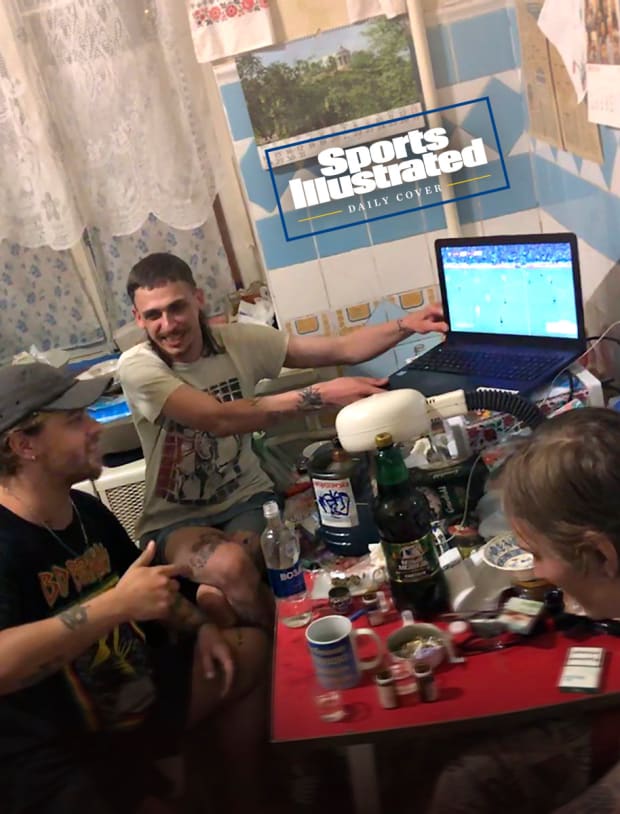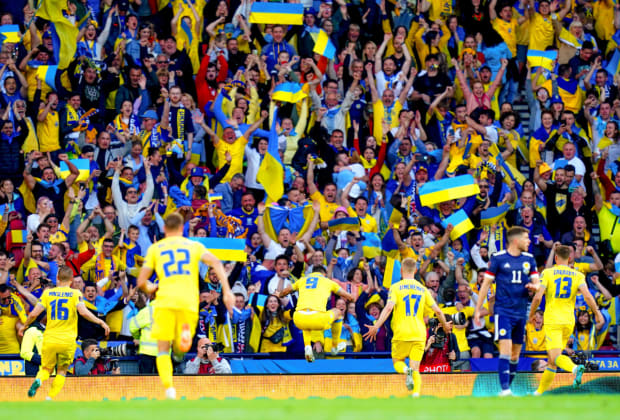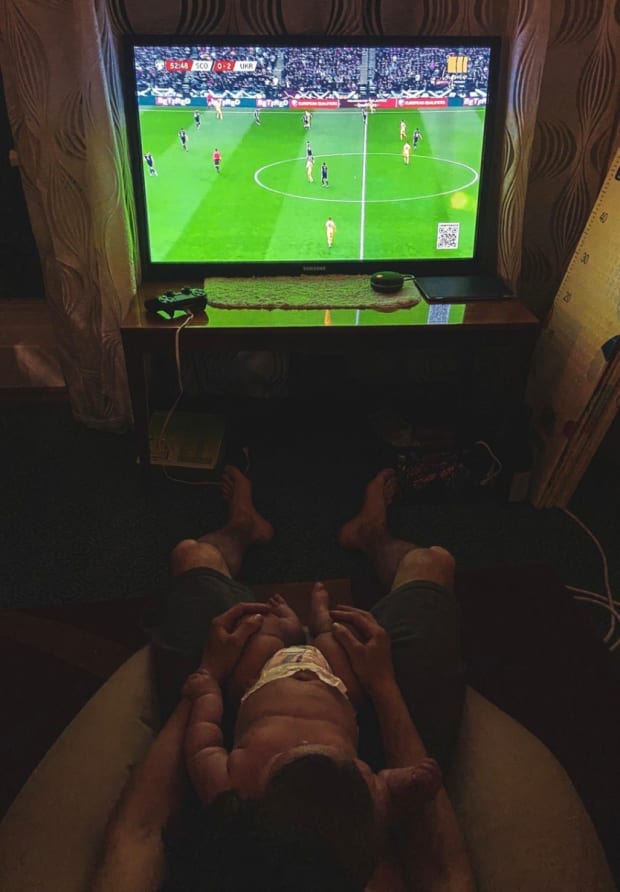There is a sports bar in Lviv, in western Ukraine, called Cantona Pub, that caters to Manchester United fans. Walk inside and the pub looks like a typical British watering hole—brick and wallpapered walls are adorned with Man United’s familiar red-and-white jerseys, scarves and other football paraphernalia. Some of the club’s all-time greats adorn the walls: Ryan Giggs, George Best, Wayne Rooney, Roy Keane and Eric Cantona himself peer through picture frame glass, frozen in time at the zenith of their careers.
Under normal circumstances, Cantona Pub would have been packed last night with fans watching Ukraine’s World Cup qualifier match against Scotland. But these are hardly normal circumstances. Torn apart by Russia’s renewed invasion on Feb. 24, Ukraine is a country at war. A nightly curfew conflicted with kickoff and prevented most venues across the country from screening the match.
“Normally, we watch all the big games in our pub with friends and a lot of other people,” Cantona’s owner, Andy Markovets, explains. “In fact, we would have had all the tables booked weeks before such a big game,” he added. “But now we face a war. There is curfew. And football isn’t the most important thing.”

Courtesy of Maxim Mytsuk
Instead of watching their team take on the Scots for a shot at the World Cup, Ukrainians across the country hunkered down at home in hopes of seeing their national team move one step closer to a chance at football’s most coveted award—and, more importantly, to reassert on the world stage that their country has the right to exist.
Since the beginning of March, I’ve reported throughout Ukraine and spoken to civilians stranded in dank basements and Ukrainian volunteers delivering humanitarian aid, and spent time embedded with the Ukrainian Armed Forces near the front line in Donbas to understand this conflict better.
What has become eminently clear from three months of reporting is that the Russians are fighting not only Ukraine’s army—they must also contend with the genesis of the Ukrainian national idea and a civilian population that firmly believes in Ukraine’s ultimate victory. The Ukraine-Scotland match is a microcosm of that belief.
“We are going through a bloody war,” Illia Novikov, a 25-year-old-journalist, tells me. “And every victory—sports or otherwise—aids us to reach victory on the battlefield, in one way or another.”

Jane Barlow/PA Images/Getty Images
Ukraine has participated in just one World Cup, the 2006 tournament held in Germany. The team beat Saudi Arabia and Tunisia while also playing Switzerland to a draw to reach the quarterfinals, where Italy beat them 3–0, ending their run. And while Ukraine’s World Cup debut was an essential step for the country’s national football team, there is much more at stake this time around.
In 2006, Ukraine had only recently emerged from the political upheaval of the Orange Revolution, a series of widespread popular protests that began two years earlier and centered on a bitterly contested presidential election that pitted the then prime minister and Kremlin favorite Viktor Yanukovych against his Westward-inclined opponent, Viktor Yushchenko.
Though Yanukovych claimed electoral victory, the election results were seen as illegitimate in most of Europe and the United States. Ultimately the Ukrainian Supreme Court threw out the results and ordered fresh elections, which Yuschenko won.
In the run up to Wednesday’s game, I reached out to a broad swath of contacts to ask them what, if anything, Ukraine’s current bid for the World Cup meant to them. The message I received: If Ukraine’s 2006 World Cup appearance was an emblem of the nation healing political fractures and protecting their fledgling democracy, an appearance at this year’s World Cup tournament is an assertion that, despite the conflagration of war, the Ukrainian nation is a permanent presence in Europe, irrespective of Moscow’s designs on the country.
“We had a very good team in 2006, and it was our debut at a World Cup,” Markovets explains. “Now we have a much younger team, and it’s a good chance for the players to prove themselves. But I don’t think that any Ukrainian players or coaching staff think that we just need to make it to the World Cup. We need our best boys and girls to stop dying because of this war.”
As if to tell gameday watchers that the Russian invasion of their country continues, an air raid alert in multiple Ukrainian regions—including Lviv, home to Markovets’s pub—sounded just before kickoff, a stark reminder that Ukraine is still a country at war. And as if in response, Ukraine replied with a goal in the 33rd minute of play—a light touch over the keeper’s head by winger Andriy Yarmolenko.

Within the context of this war, the World Cup is a venue with worldwide reach to assert Ukraine’s right to exist. And while the World Cup would be the most prominent platform for Ukraine to show it has the right to exist as a nation, it is not the first.
In May, Ukraine won the Eurovision Song Contest, an American Idol–like competition that pits musical groups from across Europe against one another. Ukraine’s entry, the rap group Kalush Orchestra, won by popular selection. Ukraine’s Eurovision win was seen at home as a win for the country and a moment to affirm to a global audience that Ukraine is a sovereign country despite the ongoing war.
In a similar vein, the Ukraine-Scotland match “is definitely more significant because of the war, when a lot of media attention is drawn to Ukraine worldwide, it’s also about our international image,” says Volodymyr Vyshkvarok, a 29-year-old IT sales head, adding that it would be a shot in the arm for morale. In addition to the international attention, speaking a few hours before the game, Novikov, the journalist, told me he believed a win “would turn into more financial and humanitarian aid to the country.”
Most of the 2022 World Cup groups—held this year in Qatar—are already set, but one spot remains open in Group B, and Ukraine is vying for the coveted place. Group B’s two strongest teams—England and the United States—have also been two of Ukraine’s staunchest allies, countries that Ukrainians highly praise for the financial and military aid they’ve rapidly provided the Ukrainian government.
The irony of facing both the United States and England at the World Cup’s group stage is not lost on Ukrainians. “I think we should only care about the next game, but even so, it would be nice to have both the United States and England in our group,” Vyshkvarok says. “I would enjoy the game and the professionalism and sportsmanship for the players. Of course, everybody plays for his own country, but there is no rivalry after the final whistle. The World Cup itself is a huge celebration.”
Given the viewing constraints imposed by nationwide martial law, however, most Ukrainians weren't able to watch the game against Scotland in large groups or at a pub. “I watched the game with my friend and dad,” says Vladimir Ursulov, a 19-year-old political science student. “Before the war, I always watched football with many friends in a bar. Now I have to do it all at home.”
The curfew in Lviv, where Vyshkvarok lives, is from 11 p.m. to 6 a.m., with a city-mandated last call at 8 p.m. Vyshkvarok and his friends initially thought about watching the match “at someone’s home and staying overnight,” but “decided to watch alone at home.” However, they did manage to catch the first half of the game at a bar, leaving at halftime to get back before curfew began.


For my part, I streamed the game from my room in a hotel in Kramatorsk, about 15 miles from the front line (the one TV in the lobby is permanently set to Ukraine’s sole operating news channel, a collective effort of formerly rival stations). During the contest I traded messages with Maxim Mytsuk, a 26-year-old from Kyiv, who had gathered at home with a handful of friends to crowd around a laptop—and an impressive array of bottles—and watch. “Very beautiful,” Mytsuk texts about Ukraine’s first goal. After the second Ukrainian goal, scored by striker Roman Yaremchuk early in the second half, he says, “I f---ing love football.” After the third, a 95th-minute strike by forward Artem Dovbyk that sealed Ukraine’s victory over the Scots, 3–1: “Yo man I’m drinking with my friends. Answer you later. We won man.”
It was a reminder of how, even among the worst circumstances, the euphoria of sports can provide a slice of normalcy. And also that, though an annoyance, watching the match at home pales compared to the plight of millions of Ukrainians who have been forced from their homes at the point of a Russian gun or ahead of incoming artillery. More than 6.8 million Ukrainians have fled the country in the most significant movement of people in Europe since World War II—a figure that is increasing by tens of thousands each day.
Amid the anguish over loved ones and uncertainty about the future, the beautiful game offers a brief and hopeful respite from the fear of war. “Today there is a war in my country, and thousands of people die every day,” Ursulov says. “The World Cup is a chance for all fans in Ukraine who are safe to escape from all this horror and cheer for our guys.”
Dmytro Kabanets, a 27-year-old native of Kharkiv in eastern Ukraine, and a new father, sees symbolism in both victory and defeat for the Ukraine national team’s World Cup bid. “Victory will be another reason for me to be proud of my country, and for the country it will be a symbol of the fact that victory will be in everything,” he explains. “Defeat will be an indication that one country cannot exist without the other, and that the support of our allies is needed even more. But I will be grateful to our football players for their effort and work.”
Ukraine’s victory over Scotland brings the country one step closer to its World Cup dreams. The team’s journey is not over, and they’ll face the potent Welsh on June 5 with a spot in Qatar on the line. But for now, the Ukrainians have made it clear that they have a team whose World Cup aspirations are achievable—and, regardless of the ongoing war, they’re still here to play and win.







